Benami Biopic
The story is familiar, the twists deliberate. Meet Guru, Dhirubhai Ambani by proxy.
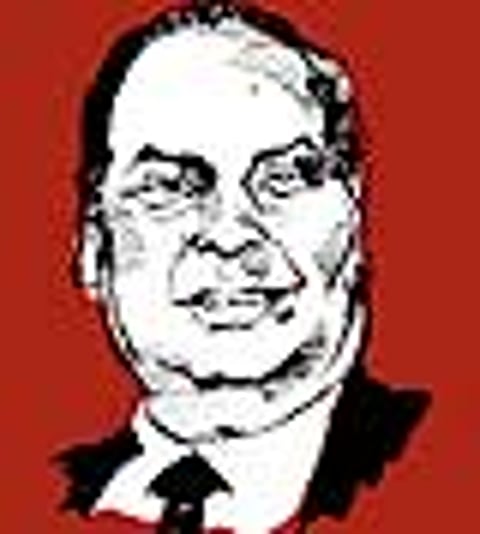
Gurubhai Desai/ Dhirubhai Ambani
From his job in Aden (Turkey in the film), building India’s largest firm, to the AGM at Brabourne Stadium
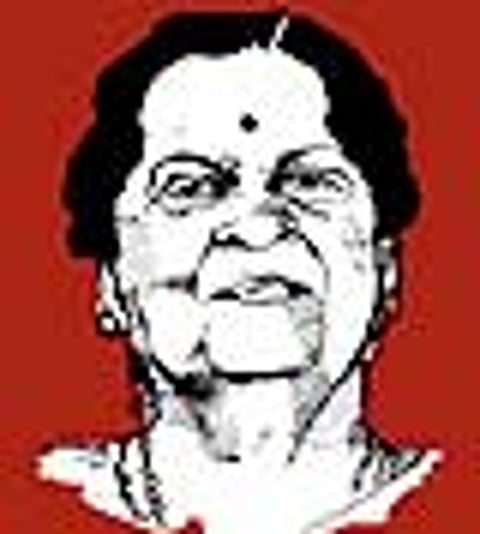
Sujata/Kokilaben
The wife who didn’t complain about anything and supported everything that Dhirubhai did, and was present at most of the company’s AGMs
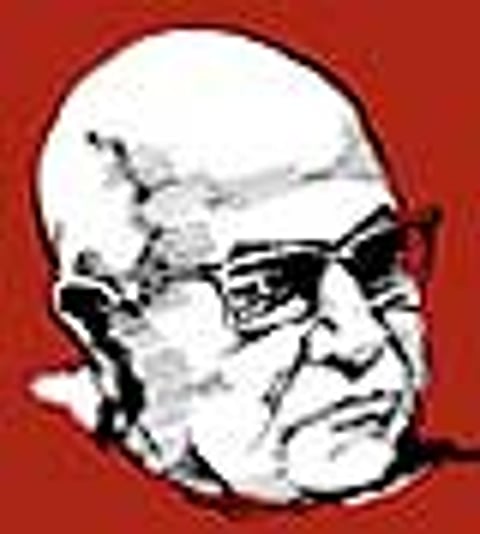
Manik Das Gupta/ Ramnath Goenka
The socialist press baron who exposed Dhirubhai’s irregularities and possibly unlawful activities

Arzaan Contractor, and his father/ Nusli Wadia
Nusli and Dhirubhai fought the most intense corporate battle for power, position and profits; they used politics and media

Shyam Saxena/ Arun Shourie
The soft-spoken, hard-hitting editor of Indian Express; he bent a few rules to prove the truth
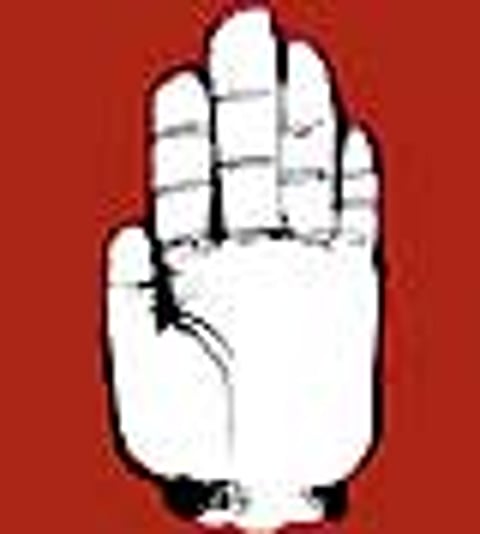
Faceless Politician/ Congress leader
He didn’t like Dhirubhai at all; but the businessman managed to woo him because of the old nexus with the politician’s relative
***
As expected, a film about a controversial entrepreneur is sure to stir things up, at least within the patriarch's family. Given the twin facts that Dhirubhai's sons, Mukesh and Anil, bitterly parted ways in 2005 and continue to battle each other, and Anil's Adlabs is involved with the movie, the reactions are more extreme. The real plot gets complicated as Anil is close to the Bachchans; Abhishek Bachchan plays the role modelled on Dhirubhai and he's called Gurubhai, a rather broad phonetic hint.
Before we delve into sensitive family issues, let's explore how Mani Ratnam has woven chapters from Dhirubhai's life into his screenplay. Both Dhirubhai and Gurubhai hailed from Gujarat, were sons of a schoolteacher, worked abroad as petrol station attendants (Dhirubhai was in Aden, Gurubhai in Turkey), and were among the first to advocate a shift from cotton to polyester. Both created India's largest private firm, tapped the stockmarkets to fuel their dreams and had a base of 30 lakh shareholders, and held AGMs at a cricket stadium.
Individually, both were supremely confident ("There is only one person like me here, only one Guru"), aggressively ambitious ("I don't want to walk, I want to run"), capable of influencing policies ("If a law can be made in a day, it can be changed in a day"), and unafraid of any adverse public or societal reactions ("I don't fear the public, I am the public"). During their lifetimes, both were saddled with allegations, faced their shareholders' ire, were stuck by paralytic strokes that crippled their bodies, but fulfilled their entrepreneurial quests.
However, what Guru has also done is to highlight contentious charges against Dhirubhai, mould movie characters to show subtle changes in real-time relationships, and portray the growing nexus between business, politics and media. Those who have followed the saga of the Reliance Industries would remember how it was accused of importing an entire plant without paying import duty, using benami entities based in tax havens to purchase its own shares, and somehow amass import licences for man-made textiles, where margins were huge.
A few apocryphal anecdotes about Dhirubhai form a part of Gurubhai's life. There's a scene where Abhishek woos an unfriendly politician, whose uncle was close to the businessman. A similar story concerning Dhirubhai and a senior Congress leader has become a part of the Ambani folklore. The blank cheque sequence between Contractor Sr and Gurubhai is reminiscent of the legendary interaction between Dhirubhai and Nusli Wadia of Bombay Dyeing that's regarded as the origin of the intense war between the two business houses. The Contractors are unmistakably similar to the Wadias with their anglicised diction, western dress sense, and Scotch-drinking habit.
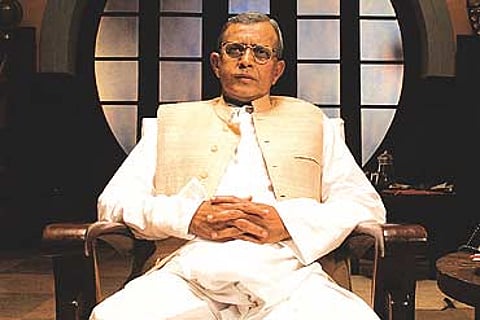
But it's the interplay between a successful and law-skirting entrepreneur, a socialist press baron (Manik Das Gupta) who's passionate about press freedom, and an idealist editor (Shyam Saxena) that makes Guru so uncannily mirror events that dominated political life in the '80s. In real life, the combine of the late Ramnath Goenka (Indian Express owner) and Arun Shourie (its editor) waged a relentless war against Dhirubhai In the movie, Shyam is a mix of Shourie, S. Gurumurthy (who then ripped the veil off Reliance's financials and now runs Swadeshi Jagaran Manch), and Maneck Davar, the lawyer who was involved in the Express campaign. Das Gupta too is part-Goenka and part-Shourie, who is today, ironically, a friend of the Ambanis.
During Dhirubhai's days, the media was sharply divided; there was no middle ground and a journalist was either with him or against him. So is the case in Guru. In the 1980s, there were stories of how Reliance distributed largesse to its friends; a story grafted into the film. One scene which stands out is Das Gupta insinuating that the safari suits worn by his employees (including journalists and peons) were gifted by Gurubhai. Several journalists who attended Reliance's AGMs those days did walk away with polyester suit lengths as gifts.
Gurubhai, like Dhirubhai, realised that two factors would protect him from political opponents, jealous competitors and zealous journos. The first was his ability to reward his lakhs of investors who, in turn, would come out in his support. Thus, it's not surprising that when Gurubhai walks in to face the commission of inquiry set up to investigate his businesses, a nondescript man stops him on the stairs and says, "I'm a cab driver from Vadala, and I managed to marry my four daughters only because I invested in your company shares."
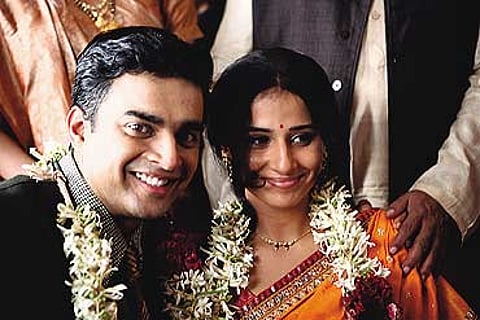
His second strategy was to grow so big, it would be impossible for his enemies and critics to clamour for punitive action against him. Once Gurubhai built India's largest corporate, even critics said he was responsible for the country's economic growth. And members of the commission of inquiry too felt he was both a genius and a thug. Finally, it let him off with minor punishment—out of 33 counts, he was found guilty on only two.
After his death, Dhirubhai was widely eulogised. One of his eulogists was none other than Shourie, who admitted Dhirubhai broke regulations that shouldn't have been there in the first place. "And that the Dhirubhais are to be thanked, not once but twice over; they set up world-class companies and facilities in spite of those regulations and thus laid the foundations for the growth all of us claim credit for today...by exceeding the limits in which those restrictions sought to impound them, they helped create the case for scrapping those regulations, they helped make the case for reforms.... We had all got convinced that persons like him had done the country a service."
It's Guru's ending that has impressed the living Ambanis, like Dhirubhai's wife, Kokilaben, Mukesh and Anil. It exonerates the patriarch and hails him as a visionary. It concludes that the Gurubhais and Dhirubhais were critical to a country's progress. They were like the Rockefellers, Fords and Vanderbilts, who're credited with building the greatest economic superpower—America.
Postscript: In light of the Anil-Adlabs-Guru connection, the Mukesh Ambani camp has a few questions. Why was Dhirubhai/ Gurubhai shown as having married Kokilaben/Sujata for the dowry money to start his business? Why was the character based on Rasikbhai Meswani, Dhirubhai's late cousin, shown in poor light? What was the need to include the irrelevant interaction between Gurubhai and the politician? Why didn't Anil put his foot down on these issues given his proximity to the Bachchans?
Tags